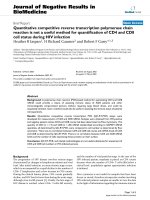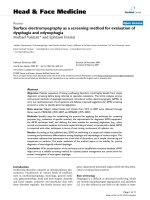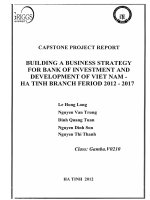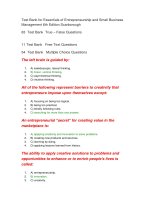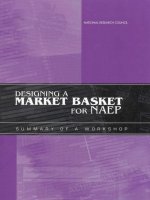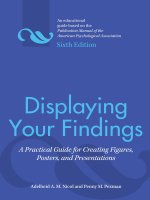Conventional Providing a Uniform Law for Bill of exchange and Promissory Notes
Bạn đang xem bản rút gọn của tài liệu. Xem và tải ngay bản đầy đủ của tài liệu tại đây (356.45 KB, 37 trang )
----------
Conventional Providing a Uniform Law for
Bill of exchange and Promissory Notes
TITLE I - Bills of Exchange
CHAPTER I. - Issue and Form of a Bill of Exchange
Article 1
Article 2
Article 3
Article 4
Article 5
Article 6
Article 7
Article 8
Article 9
Article 10
CHAPTER II. - Endorsement
Article 11
Article 12
Article 13
Article 14
Article 15
Article 16
Article 17
Article 18
Article 19
Article 20
CHAPTER III. - Acceptance
Article 21
Article 22
Article 23
Article 24
Article 25
Article 26
Article 27
Article 28
Article 29
CHAPTER IV. - 'Avals'
Article 30
Article 31
Article 32
CHAPTER V. - Maturity
Article 33
Article 34
Article 35
Article 36
Article 37
CHAPTER VI. - Payment
Article 38
Article 39
Article 40
Article 41
Article 42
CHAPTER VII. - Recourse for Non-Acceptance or Non-Payment
Article 43
Article 44
Article 45
Article 46
Article 47
Article 48
Article 49
Article 50
Article 51
Article 52
Article 53
Article 54
CHAPTER VIII. - Intervention for Honour
I. General Provisions
Article 55
2. Acceptance By Intervention (For Honour)
Article 56
Article 57
Article 58
3. Payment by Intervention
Article 59
Article 60
Article 61
Article 62
Article 63
CHAPTER IX. - Parts of A Set, and Copies
I. Parts of A Set
Article 64
Article 65
Article 66
2. Copies
Article 67
Article 68
CHAPTER X. - Alterations
Article 69
CHAPTER XI. - Limitation of Actions
Article 70
Article 71
CHAPTER XII. - General Provisions
Article 72
Article 73
Article 74
TITLE II - Promissory Notes
Article 75
Article 76
Article 77
Article 78
Document Information (metadata)
Convention Providing a Uniform Law For Bills of
Exchange and Promissory Notes
(Geneva, 1930) The League of Nations
1
Articles I - XI [Omitted].
TITLE I - Bills of Exchange
2
CHAPTER I. - Issue and Form of a Bill of Exchange
3
Article 1
4
A bill of exchange contains:
5
1. The term 'bill of exchange' inserted in the body of the
instrument and expressed in the language employed in
drawing up the instrument;
6
2. An unconditional order to pay a determinate sum of
money;
7
3. The name of the person who is to pay (drawee);
8
4. A statement of the time of payment;
9
5. A statement of the place where payment is to be
made;
10
6. The name of the person to whom or to whose order
payment is to be made;
11
7. A statement of the date and of the place where the
bill is issued;
12
8. The signature of the person who issues the bill
(drawer).
13
Article 2
14
An instrument in which any of the requirements
mentioned in the preceding Article is wanting is invalid
as a bill of exchange, except in the cases specified in the
following paragraphs:
15
A bill of exchange in which the time of payment is not
specified is deemed to be payable at sight.
16
In default of special mention, the place specified beside
the name of the drawee is deemed to be the place of
payment, and at the same time the place of the domicile
of the drawee.
17
A bill of exchange which does not mention the place of
its issue is deemed to have been drawn in the place
mentioned beside the name of the drawer.
18
Article 3
19
A bill of exchange may be drawn payable to drawer's
order. It may be drawn on the drawer himself. It may be
drawn for account of a third person.
20
Article 4
21
A bill of exchange may be payable at the domicile of a
22
third person either in the locality where the drawee has
his domicile or in another locality.
Article 5
23
When a bill of exchange is payable at sight, or at a fixed
period after sight, the drawer may stipulate that the sum
payable shall bear interest. In the case of any other bill
of exchange, this stipulation is deemed not to be written
(non ?crite).
24
The rate of interest must be specified in the bill; in
default of such specification, the stipulation shall be
deemed not to be written (non ?crite).
25
Interest runs from the date of the bill of exchange,
unless some other date is specified.
26
Article 6
27
When the sum payable by a bill of exchange is expressed
in words and also in figures, and there is a discrepancy
between the two, the sum denoted by the words is the
amount payable. Where the sum payable by a bill of
exchange is expressed more than once in words or more
than once in figures, and there is a discrepancy, the
smaller sum is the sum payable.
28
Article 7
29
If a bill of exchange bears signatures of persons
incapable of binding themselves by a bill of exchange, or
forged signatures, or signatures of fictitious persons, or
signatures which for any other reason cannot bind the
persons who signed the bill of exchange or on whose
behalf it was signed, the obligations of the other persons
who signed it are none the less valid.
30
Article 8
31
Whosoever puts his signature on a bill of exchange as
representing a person for whom he had no power to act
is bound himself as a party to the bill and, if he pays,
has the same rights as the person for whom he
purported to act. The same rule applies to a
representative who has exceeded his powers.
32
Article 9
33
The drawer guarantees both acceptance and payment.
He may release himself from guaranteeing acceptance-
every stipulation by which he releases himself from the
guarantee of payment is deemed not to be written
(non ?crite).
34
Article 10
35
If a bill of exchange, which was incomplete when issued,
has been completed otherwise than in accordance with
the agreements entered into, the non-observance of
such agreements may not be set up against the holder
unless he has acquired the bill of exchange in bad faith
or, in acquiring it, has been guilty of gross negligence.
36
CHAPTER II. - Endorsement
37
Article 11
38
Every bill of exchange, even if not expressly drawn to
order, may be transferred by means of endorsement.
39
When the drawer has inserted in a bill of exchange the
words 'not to order' or an equivalent expression, the
instrument can only be transferred according to the
form, and with the effects of an ordinary assignment.
40
The bill may be endorsed even in favour of the drawee,
whether he has accepted or not, or of the drawer, or of
any other party to the bill. These persons may re-
endorse the bill.
41
Article 12
42
An endorsement must be unconditional. Any condition to
which it is made subject is deemed not to be written
(non ?crite). A partial endorsement is null and void. An
endorsement 'to bearer' is equivalent to an endorsement
in blank.
43
Article 13
44
An endorsement must be written on the bill of exchange
or on a slip affixed thereto (allonge). It must be signed
by the endorser.
45
The endorsement may leave the beneficiary unspecified
or may consist simply of the signature of the endorser
(endorsement in blank). In the latter case, the
endorsement, to be valid, must be written on the back of
the bill of exchange or on the slip attached thereto
(allonge).
46
Article 14
47
An endorsement transfers all the rights arising out of a
bill of exchange. If the endorsement is in blank, the
holder may:
48
1. Fill up the blank either with his own name or with the
name of some other person;
49
2. Re-endorse the bill in blank, or to some other person;
50
3. Transfer the bill to a third person without filling up the
blank, and without endorsing it.
51
Article 15
52
In the absence of any contrary stipulation, the endorser
guarantees acceptance and payment. He may prohibit
any further endorsement; in this case, he gives no
guarantee to the persons to whom the bill is
subsequently endorsed.
53
Article 16
54
The possessor of a bill of exchange is deemed to be the
lawful holder if he establishes his title to the bill through
an uninterrupted series of endorsements, even if the last
endorsement is in blank. In this connection, cancelled
endorsements are deemed not to be written (non ?crits).
When an endorsement in blank is followed by another
endorsement, the person who signed this last
endorsement is deemed to have acquired the bill by the
endorsement in blank.
55
Where a person has been dispossessed of a bill of
exchanged, in any manner whatsoever, the holder who
establishes his right thereto in the manner mentioned in
the preceding paragraph is not bound to give up the bill
unless he has acquired it in bad faith, or unless in
acquiring it he has been guilty of gross negligence.
56
Article 17
57
Persons sued on a bill of exchange cannot set up against
the holder defences founded on their personal relations
with the drawer or with previous holders, unless the
holder, in acquiring the bill, has knowingly acted to the
detriment of the debtor.
58
Article 18
59
When an endorsement contains the statements 'value in
collection' ('valeur en recouvrement'), 'for collection'
('pour encaissement'), 'by procuration' ('par
procuration') or any other phrase implying a simple
mandate, the holder may exercise all rights arising out
of the bill of exchange, but he can only endorse it in his
capacity as agent.
60
In this case, the parties liable can only set up against
the holder defences which could be set up against the
endorser.
61
The mandate contained in an endorsement by
procuration does not terminate by reason of the death of
the party giving the mandate or by reason of his
becoming legally incapable.
62
Article 19
63
When an endorsement contains the statements 'value in
security' ('valeur en garantie'), 'value in pledge' ('valeur
en gage'), or any other statement implying a pledge, the
holder may exercise all the rights arising out of the bill
of exchange, but an endorsement by him has the effects
only of an endorsement by an agent.
64
The parties liable cannot set up against the holder
defences founded on their personal relations with the
endorser, unless the holder, in receiving the bill, has
knowingly acted to the detriment of the debtor.
65
Article 20
66
An endorsement after maturity has the same effects as
an endorsement before maturity. Nevertheless an
endorsement after protest for non-payment, or after the
67
expiration of the limit of time fixed for drawing up the
protest, operates only as an ordinary assignment.
Failing proof to the contrary, an endorsement without
date is deemed to have been placed on the bill before
the expiration of the limit of time fixed for drawing up
the protest.
68
CHAPTER III. - Acceptance
69
Article 21
70
Until maturity, a bill of exchange may be presented to
the drawee for acceptance at his domicile. either by the
holder or by a person who is merely in possession of the
bill.
71
Article 22
72
In any bill of exchange, the drawer may stipulate that it
shall be presented for acceptance with or without fixing
a limit of time for presentment.
73
Except in the case of a bill payable at the address of a
third party or in a locality other than that of the domicile
of the drawee, or, except in the case of a bill drawn
payable at a fixed period after sight, the drawer may
prohibit presentment for acceptance.
74
He may al so stipulate that presentment for acceptance
shall not take place before a named date.
75
Unless the drawer has prohibited acceptance, every
endorser may stipulate that the bill shall be presented
for acceptance, with or without fixing a limit of time for
presentment.
76
Article 23
77
Bills of exchange payable at a fixed period after sight
must be presented for acceptance within one year of
their date. The drawer may abridge or extend this
period. These periods may be abridged by the endorsers.
78
Article 24
79
The drawee may demand that a bill shall be presented to
him a second time on the day after the first
presentment. Parties interested are not allowed to set up
that this demand has not been complied with unless this
request is mentioned in the protest.
80
The holder is not obliged to surrender to the drawee a
bill presented for acceptance.
81
Article 25
82
An acceptance is written on the bill of exchange. It is
expressed by the word 'accepted' or any other
equivalent term. It is signed by the drawee. The simple
signature of the drawee on the face of the bill constitutes
an acceptance.
83
When the bill is payable at a certain time after sight, or
when it must be presented for acceptance within a
certain limit of time in accordance with a special
stipulation the acceptance must be dated as of the day
when the acceptance is given unless the holder requires
it shall be dated as of the day of presentment. If it is
undated, the holder, in order to preserve his right of
recourse against the endorsers and the drawer, must
authenticate the omission by a protest drawn up within
the proper time.
84
Article 26
85
An acceptance is unconditional, but the drawee may
restrict it to part of the sum payable. t Every other
modification introduced by an acceptance into the tenor
of the bill of exchange operates as a refusal to accept.
Nevertheless, the acceptor is bound according to the
terms of his acceptance.
86
Article 27
87
When the drawer of a bill has indicated a place of
payment other than the domicile of the drawee without
specifying a third party at whose address payment must
be made, the drawee may name such third party at the
time of acceptance. In default of this indication, the
acceptor is deemed to have undertaken to pay the bill
himself at the place of payment.
88
If a bill is payable at the domicile of the drawee, the
latter may in his acceptance indicate an address in the
same place where payment is to be made.
89
Article 28
90
By accepting, the drawee undertakes to pay the bill of
exchange at its maturity. In default of payment, the
holder, even if he is the drawer, has a direct action on
the bill of exchange against the acceptor for all that can
be demanded in accordance with Articles 48 and 49.
91
Article 29
92
Where the drawee who has put his acceptance on a bill
has cancelled it before restoring the bill, acceptance is
deemed to be refused. Failing proof to the contrary, the
cancellation is deemed to have taken place before the
bill was restored.
93


